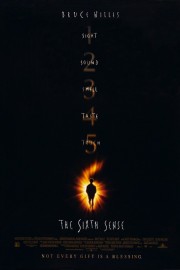The Sixth Sense
Once the credits roll on “The Sixth Sense,” the question of how good the movie is turns from how well the story mechanics in M. Night Shyamalan’s breakthrough ghost story work, to how well it holds up on multiple viewings. After all, after the revelation of Bruce Willis’s Malcolm Crowe becomes known to us, it becomes a different movie. We can never unlearn that information, so we have to go back into Shyamalan’s story, and see how it folds into the larger narrative at work. I still cry at the end of what this movie has to offer.
The film hinges on a single truth- that Haley Joel Osment’s Cole Sear sees “dead people,” as he so memorably put it to Crowe, a child psychologist, from his hospital bed. The film’s climax hinges on two truths in the film’s reality- that these dead people “don’t know they’re dead,” and that Crowe is, in fact, one of them. It’s been 20 years- if you don’t realize these plot devices in the film by now, I’m not going to shield you from them. Besides, the film’s rewatch value, after two decades, is not in what secrets it revealed after the first watching, but how they fit into the narrative, and what that story is about. This is a ghost story, to be sure, but ghosts exist for the purpose of telling a story about four people- Cole, Crowe, Crowe’s wife, Anna (Olivia Williams), and Cole’s mother, Lynn (Toni Collette)- who are trying to get past individual pain, and figuring out what is holding them back from peace. One of the primary things is communication; no one is really communicating with one another, and that is a killer for each of the dynamics at play here.
The film begins with a scene where a former patient of Malcolm Crowe’s (played by an exceptional Donnie Wahlberg, filled with pain) breaks into Malcolm and Anna’s home, and- before he shoots himself- tries to get Crowe to remember who he is, so that he knows whom he failed. Cut to the next Fall, and Crowe is sitting outside, looking at his notes for Cole, a young boy whom he’s noticed has similar issues with Vincent Gray, Wahlberg’s character. Of course, the reveal is that Crowe was shot and killed by Vincent before he killed himself; Crowe is haunting Cole, whom he follows into a church, and communicates with. Cole talks with him, but does not feel like he can help him. When Cole tells Crowe his secret later, while Cole is in the hospital, Crowe wonders whether he can help him, either. Shyamalan puts hints throughout the film of his eventual endgame- namely, his use of the color red, the temperature being down when ghosts are around, and the fact that Crowe never touches anyone- but our focus remains on the characters; this, along with “Unbreakable,” is Shyamalan at his most controlled, and character-driven, and it’s why these two films remain his best ones now.
The film shifts from being a film about Crowe to one about Crowe and Cole together with Cole’s revelation, and for Willis and Osment, it’s among the best work of their careers. Save for a magic trick that lands like a thud with Cole (who thinks it’s supposed to be funny), there are not a lot of typical Willis mannerisms in this role, and it’s not a “hero” role for Willis. He is as much an average guy as we’ve seen him since the first “Die Hard,” and the way he brings those emotions to the film, especially when he is reacting to Anna as the film goes on beyond that first scene; Olivia Williams doesn’t have much of a character to play after that opening scene, but she makes Anna’s grief over Crowe dying palpable, even if it isn’t immediately felt as grief. We know something is off between them, and we feel that in their performances. For Osment, this was his breakthrough, and he is exceptional as a kid whose unique gifts make him feel outcast, and emotionally, he’s unable to connect with even his own mother because of them. The other key relationship in the film is between Cole and his mother, and it’s easy to forget how good Collette is here. She’s a mother whom is doing everything she can to keep her “little family” together, working two jobs, and trying to be both parents for Cole. But when the spirits surrounding Cole do things like open the kitchen cabinets, or her bumblebee pendant being taken, it causes an unease between the two. We know how much she loves Cole, though; there are moments- when Cole is locked in a closet, after a fright when Cole is scared to sleep on his own- between the two that just get the emotions running high, and Collette fully deserved her Oscar nomination for this film.
Everything comes down to the ending, though, and that’s what makes “The Sixth Sense” succeed in the long run. The first conclusion is to Cole and Crowe’s story, where Crowe has shown Cole that he does not have to be frightened of his gift, and can use it with his compassion to help people. Next is the last scene with Cole and his mother- which was the opening of the original trailer- and my God the way that scene progresses into its emotional climax always gets me, because it’s about Cole becoming the communicative son his mother wants him to be, and his mother being able to accept what he’s communicating. And then, we end where we began, with Crowe and his wife, and him finally realizing what he didn’t before, and his purpose for helping Cole…so he could find peace for himself, and for the wife he didn’t know he had left behind. Shyamalan sticks the landing, and it’s one that sticks with you long after you watch the film.










